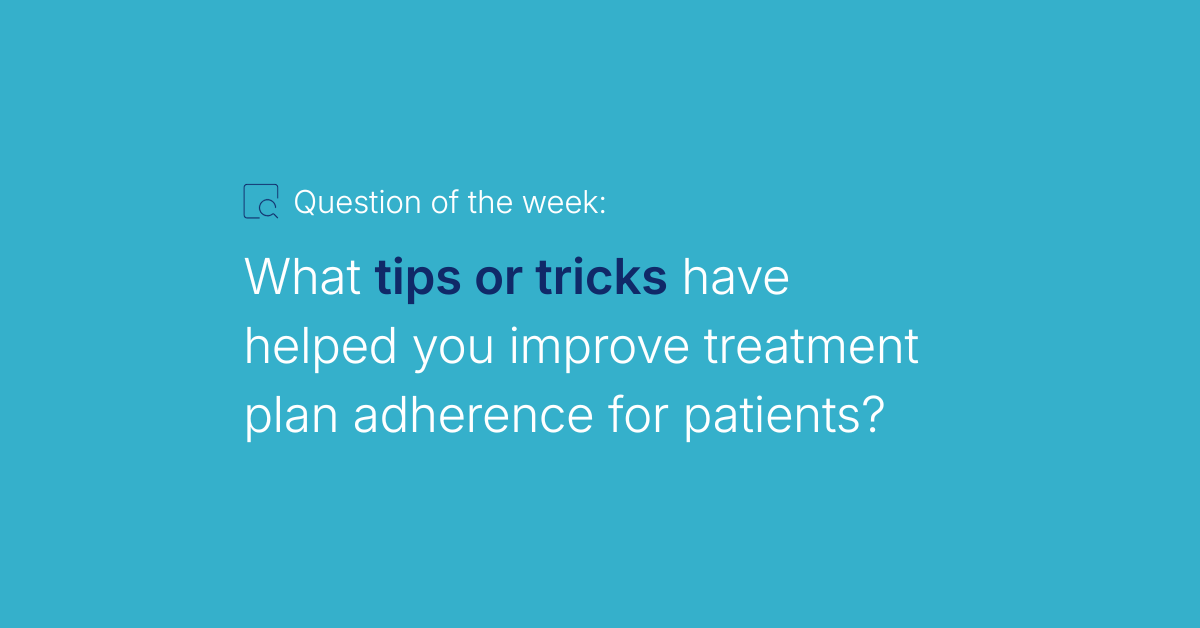
Practical tips for improving treatment plan adherence
Improving treatment plan adherence remains one of the most persistent challenges in clinical practice. Even the most effective therapies depend on patients following through consistently—and small gaps in adherence can significantly impact outcomes, quality of life, and healthcare costs.
On Healthcasts, practitioners across specialties shared simple, human-centered strategies, rooted in trust, clarity, and support, to help patients stay on track.
How do you improve treatment adherence in patients? Log in or sign up to read the full case, see the Consensus, and share your own thoughts.



 Question of the week
Question of the week
 Comments
Comments
Key takeaways about how to improve treatment adherence:
- Trust drives adherence
Follow-ups, whether a quick call, message, or visit, show patients they’re supported. That connection builds trust and accountability, both key to keeping treatment plans on track. - Clear communication matters
Simple, consistent messaging helps patients follow through. Having them repeat instructions, providing written summaries, and explaining the “why” behind each step reinforces understanding and confidence. - Small systems make a big difference
Text reminders, automatic refills, and linking meds to daily habits make adherence easier. Thoughtful use of technology supports consistency without replacing personal care.
Oncology/Hematology
"If possible, have your nurse, staff, or even yourself follow up, especially when starting new treatment. Just a phone call or message goes a long way in demonstrating care and trust."
Cardiology
"To promote patient understanding and adherence, I use several strategies. I ask patients to repeat key points at the end of the visit, provide a clear after-visit summary, and follow up with short calls or text reminders. I also incorporate motivational interviewing and case manager support to reinforce engagement and compliance."
Oncology/Hematology
"Data clearly shows that adherence drops off with more than once a day dosing, so it's best to choose daily meds over bid or more frequently dosed ones whenever possible. It's also key to give space and permission for patients to honestly share how they're doing with adherence by acknowledging that no one takes meds perfectly..."
Neurology
"I’ve learned that improving adherence often starts with accountability and partnership, not just reminders. I make it a point to schedule consistent follow-ups, whether in person or virtually, to track progress and address challenges early. I also involve patients in setting achievable goals, so they feel ownership of their care rather than seeing it as a routine task.
Over time, that shared commitment and regular feedback tend to strengthen trust, motivation, and consistency far more than any app or device alone."
Internal Medicine
"Getting written instructions in their hands as well as having them repeat the instructions back to make sure they heard it to begin with."
Dermatology
"I spend the time to explain why adherence and consistency are important and give them a timeline of when to expect improvement to prevent them from being discouraged. I also discuss some myths that they may encounter on social media, as well as the best methods to improve compliance: for example, keep it next to your nightstand or toothbrush, set a reminder on your phone, etc."
Family Practice
"Creating health apps and notifications as well as informing their loved ones so they keep track of them as well."
Oncology/Hematology
"I make sure patients and their families can accurately repeat back my visit summary, supported by nurses who provide checklist-style summaries and automated reminders for appointments, tests, and imaging to reinforce understanding and adherence."
Nurse Practitioners
"Coordinating automatic refills with pharmacy, encouraging use of electronic medical chart to provide for email/text reminders."
Oncology/Hematology
"I emphasize using technology to support adherence, like smartphone apps that send reminders or track doses. I also encourage patients to link medications to daily habits and to coordinate refills so they don’t run out unexpectedly. These small system-level strategies can make staying on schedule much easier."
Read additional strategies shared by our community and comment on what you've found to work on Healthcasts.

